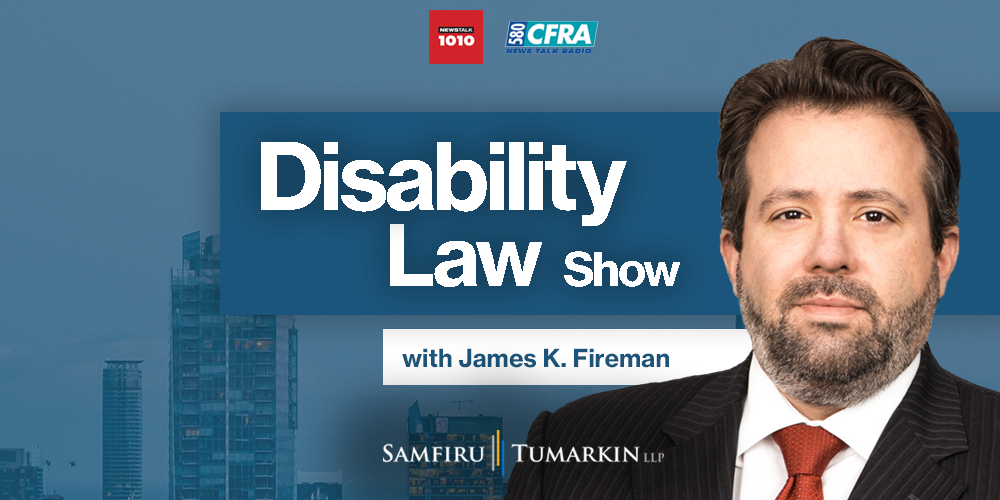Disability Law Show Bell Radio – S3 E19

Episode Summary
Discover your rights and the truth about insurance companies and long-term disability claims on Season 3 Episode 19 of the Disability Law Show on Newstalk 1010 in Toronto.
Listen below to James K. Fireman, Disability lawyer at Samfiru Tumarkin LLP, as he guides you through the proper steps to take when your insurance provider cuts off your long-term disability or denies your insurance claim.
Listen to the Episode
Episode Notes
I work in a physical job and had a back injury so had to take time off work. The disability insurer turned down my request for short-term disability despite notes from a chiropractor as a chiropractor is not a doctor. Is this true?
That’s just reaching for an excuse in that situation. Maybe you know it’s possible that you have a policy that’s worded in a way that requires someone with a medical degree a doctor an MD to make a diagnosis. I don’t typically see that in the policies. But let’s assume even for a moment that that is what this particular person’s policy required. It doesn’t require the doctor to be providing the hands-on treatment. In fact, that is rarely the case. It’s not like a doctor is administering the medication where the doctor is actually doing the physiotherapy. The doctor is there to provide a diagnosis and to provide a treatment recommendation and prognosis. In certain cases, I suppose the doctor might be directly providing the treatment. But I can’t imagine a scenario where an insurer could rely on the fact that the doctor weren’t themselves providing the treatment as far as I’m concerned.
What’s the biggest misunderstanding people have about the legal process and disability claims?
People have the understanding that when you start the legal process in a disability claim that it is really going to be something that you’re going to be heavily involved in, that it’s going to be a prominent force in your life while the litigation is going on. And that really is not true. It is for the most part, very much in the background. It doesn’t take very long for a disability claim from start to finish, usually about 8-10 months and my clients involvement is very minimal. So that is a big misunderstanding from my perspective.
My long-term claim was denied. I’m a graphic designer and my employer told me I had to return to work when my claim was denied. My doctor approved me to return to work for 4 hours a day. I’m not sure I can do much more any time soon as a computer screen is what aggravated my concussion symptoms. Is this worth appealing?
So, Ryan has gone back to work at four hours a day and now he’s at 4.5 and he’s not saying that he can’t do more, he’s saying right now it’s difficult. So, it seems like it’s pretty gradual and even at four hours a day, most policies, there’s going to be some residual benefit there where you wouldn’t get the full benefit at four hours back per day, but you would get some portion of your monthly disability benefits, they would still be available to you as long as you can show that you still couldn’t go back full-time. But it is not a huge amount. You know, it might be $500 or $1000 depending on how much you were earning per month. And if Ryan is back at work full-time in 56 months, that’s a pretty small claim. And it may not be something worthwhile pursuing. On the other hand, if Ryan doesn’t get better or in fact if he gets worse, it’s a much bigger claim and then you want to pursue it through the regular legal system. And so right now, I’m not sure what Ryan should be doing other than waiting to see how his return to work works out. If he’s able to go full time in the next few months, then it’s probably small claims. And because of that, my advice here would actually be to wait a few months. And if you’re going to wait anyway, you might as well throw the appeal out there. Don’t hold your breath that it’s going to be successful.
If someone has just applied for LTD benefits, what next steps should they expect from the insurance company?
When the claim comes in to the insurance company first thing they’re going to do is take a look at is obviously a diagnosis if there’s one available. And then they’re going to look at your job description and what your job entails. Then they’re going to take that information and compare it to the limitations that your medical providers are indicating you have. And they will compare the two and see if this person meets the definition of being totally disabled. There will probably be a phone interview with you at some point. During the adjudication process, they may write to your physicians to get further information or clarifications. It’s also possible that they might need an independent medical assessment performed on you in order to come to a decision. All in all you’re looking at maybe a 2-4 month process.
I was diagnosed with a degenerative disease about 10 years ago and I’ve done every kind of treatment but things have just gotten much worse. I’m a senior account executive and my job requires me to deal with customers on a regular basis. My GP and specialist both have encouraged me to stop working but my claim for LTD was denied. They said there hasn’t been any significant change in my condition.
It’s absolutely worth pursuing. So, let’s first of all make this very simple. If you have disability insurance and your doctors are telling you that you should not be working, you are almost certainly going to be entitled to disability benefits. You will almost certainly pass that test. And if the insurer doesn’t agree if it ever went in front of a judge, the judge almost certainly is going to side with what the treating doctors are saying, save except for some technicality and the policy if there is a pre-existing exclusion or something like that. But those are pretty unusual if your doctors are telling you that you’re disabled from work accord is almost always going to agree. So, yes, it is worth pursuing.
I’m a full-time employee with short-term and long-term coverage however I also have my own business. Will my insurance benefits cover both my employment income and business losses?
So this is insurance that this person has gotten through his employer as part of a group plan. And when you do that your disability benefit is going to be based on whatever is stated by your employer as your as your level of income. If this policy is through a group insurance plan with your employer, then it will only be based on your employment income, whatever you’re doing on your own, whatever your own businesses is, is going to be separate and apart from that. And so, if you’re not able to return, not just to your employment, but to your side business, unfortunately, that’s almost certainly not going to be covered by your group disability plan. You would need to go out and purchase a separate private policy to cover you for that side business. But it’s something to think about if you do have a side business that you want to make sure you’re covered for, make sure you go and get a private policy.
I was involved in a bad motorcycling accident years ago and still have chronic pain in my neck and back. I started getting chronic sinus infections. Sometimes I have coughing fits that prevent me from talking. My doctors and the specialists still don’t know what’s wrong. I’ve been trying to get LTD for a year now and keep getting declined. They say that chronic sinus infections and chronic back pain is not severe enough.
That’s a little difficult to answer without having the insurance file, but that doesn’t mean that there’s really going to be any valid justification for it. If your doctors are telling you that you can’t work, and if you’re having symptoms that make it really impossible for you to be able to work with any consistency to be able to concentrate on what you’re doing, then you’re disabled from work. I don’t know exactly what the insurer has done here to try and justify that, but I can assure you that it wouldn’t take very long to go through the file and figure that out. I don’t know what’s happened here without having a stronger look at the file but suffice it to say that as long as your treating doctors are telling you that you’re not able to work, then you’re going to be entitled to your benefits. It doesn’t matter what is behind your conditions, it doesn’t matter what is causing your symptoms. It matters that you are experiencing symptoms that are limiting your function. And that really seems to be the case here.




